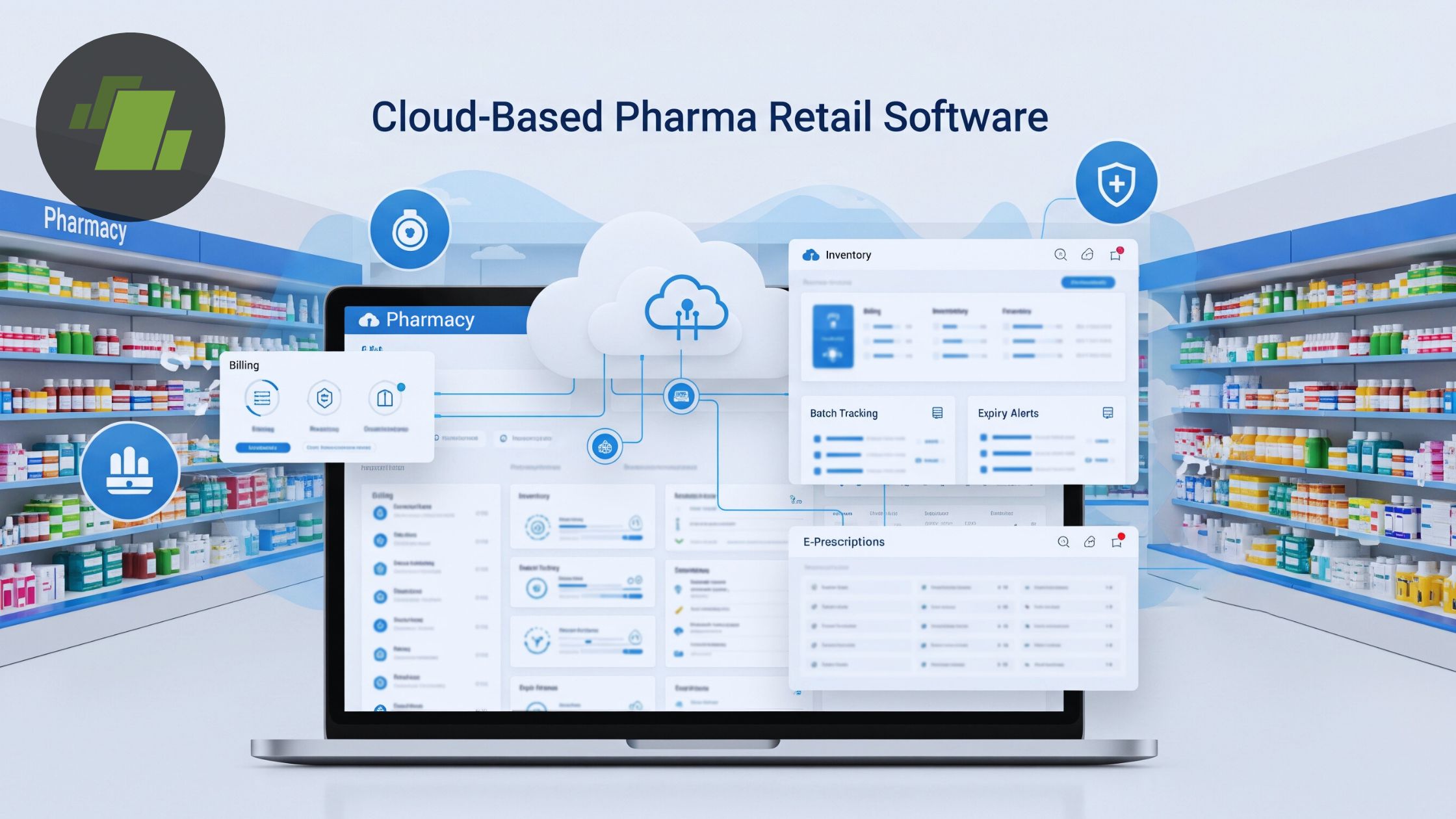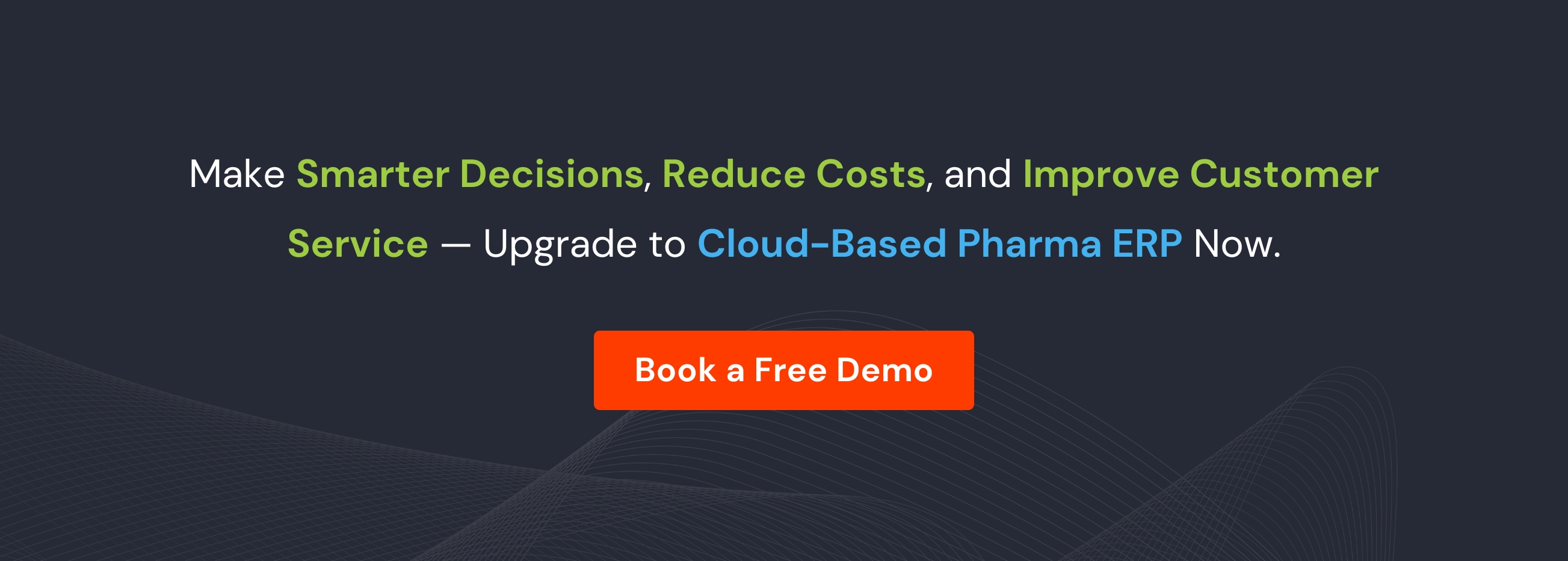Cloud-Based Pharma Retail Software: Advantages for Pharmacy Chains and Independent Stores


Introduction
Pharmacies are the backbone of the global healthcare system. In today’s fast-evolving pharmaceutical retail ecosystem, pharmacies, whether a single store or a chain, are under increasing pressure to manage inventory, billing, regulatory compliance, customer data, and overall growth efficiently.
The best cloud-based pharma retail software (also known as pharmacy ERP software, pharma retail billing software, pharma inventory software, and pharmacy billing software) offers the perfect solution for managing pharmacy businesses of all sizes by centralizing all operations on a single platform. By using pharma cloud software, pharmacies can streamline operations, improve customer service, reduce costs, and scale easily.
This article explores the many advantages of cloud-based pharma retail software for both pharmacy chains and independent pharmacies, covering real-world benefits, key features, implementation considerations, and how it supports regulatory, business, and operational goals.
What is Cloud-Based Pharma Retail Software?
To start, let’s clarify what we mean by “cloud-based pharma retail software.”
- Pharmacy retail software (or pharma retail software) is a system that helps to manage pharmacy operations: billing, inventory, order management, supplier purchasing, expiry tracking, etc.
- When this software is cloud-based, it means the core system (database, application) is hosted on remote servers (in the “cloud”) and accessed via the internet, rather than being fully installed on local servers in each pharmacy.
- The best ERP software for pharmaceutical industry (or ERP pharma software) connects billing, inventory, procurement, customer data, and finance modules into a unified platform.
Cloud-based pharma retail software thus provides a comprehensive, integrated, always-on solution for modern pharmacy operations.
Why Cloud-Based Software Is Becoming the Standard in Pharmacy Retail
1. Real-Time Inventory Visibility & Control
One of the biggest challenges for pharmacies is managing inventory, especially medicines that expire, controlled substances, and high-velocity SKUs. Cloud-based systems provide real-time tracking of stock levels, batch numbers, expiry dates, and reorder alerts.
Modern pharmacy POS and ERP systems track every sale and prescription while automatically updating inventory. This reduces the chances of stockouts, overstocking, and manual inventory errors.
Real-time visibility enables automatic reordering based on predefined thresholds, improving procurement efficiency. With cloud infrastructure, inventory data from multiple store locations is synchronized centrally, eliminating discrepancies and enabling chain-wide control.
Benefit:
Improved stock control, reduced wastage due to expired medicines, better cash flow, and higher service levels.
2. Reduced Upfront Cost & Better Scalability
Cloud-based pharmacy software eliminates these costs through a subscription or pay-as-you-go model.
The implementation of cloud software for pharmacy stores also removes the need for expensive servers and reduces dependence on in-store IT staff. It scales easily as your business grows, whether you add new branches, registers, warehouses, or users. Pharmacy chains can manage multiple outlets without replicating physical infrastructure in every store.
Benefit:
Lower financial barrier to entry for small or medium pharmacies, plus flexible and cost-effective scaling for pharmacy chains.
3. Remote Access & Central Control
Cloud-based pharmacy software gives owners and managers remote access to critical business data from any location and device. This is especially beneficial for pharmacy chains spread across multiple geographies.
Managers can monitor inventory, sales, profitability, expiries, and daily performance from a centralized dashboard. Real-time synchronization ensures that all store data remains accurate and up-to-date.
Independent pharmacies also benefit from remote access, enabling owners to review reports, check stock, and oversee operations even when off-site.
Benefit:
Better oversight, faster decision-making, and stronger operational control.
4. Automatic Updates, Maintenance & Data Backup
Cloud systems eliminate the need for pharmacies to manually manage updates, patches, and data backups. The software provider automatically pushes updates, ensuring you always have the latest features, regulatory changes, and security improvements.
Hardware failures, system crashes, or local data corruption don’t threaten business continuity because data is securely stored and backed up in the cloud. Disaster recovery features ensure that pharmacies can resume operations quickly without permanent data loss.
Benefit:
Reduced operational burden, minimal downtime, and robust data protection.
5. Enhanced Security & Compliance
Security and compliance are crucial in pharmacy operations due to sensitive patient data, prescriptions, and financial information.
Cloud pharmacy software provides strong encryption, access controls, authentication protocols, and continuous backups. It facilitates compliance by maintaining audit trails, batch tracking, expiry monitoring, and controlled drug management.
For chains and distributors, cloud ERP supports centralized compliance management and helps generate regulatory reports accurately and quickly.
Benefit:
Stronger data security, simpler compliance, and increased trust among customers and regulators.
6. Improved Efficiency and Productivity
Cloud-based pharma retail software automates routine tasks and streamlines workflows.
Tasks such as prescription refills, reorder generation, billing, purchase orders, and reporting can be automated. Staff access levels can be set based on roles, helping reduce errors and improving accountability. Barcode-based dispensing reduces mistakes and accelerates checkout time.
Cloud ERP systems often integrate CRM, enabling pharmacies to manage patient profiles, send refill reminders, offer loyalty rewards, and build stronger relationships.
Benefit:
More efficient operations, fewer manual errors, and improved patient-oriented service.
7. Better Analytics, Reporting & Decision-Making
Cloud systems provide pharmacies with real-time dashboards and advanced analytics to help them make data-driven decisions.
Pharmacies can track KPIs such as sales performance, stock turnover, expiry risks, procurement efficiency, and customer behavior. Reports can be generated instantly by store, supplier, time period, or product type.
AI-enhanced forecasting tools help predict demand, optimize purchasing, and reduce wastage.
Benefit:
Stronger strategic planning, cost savings, and operational optimization.
8. Improved Customer & Patient Experience
Cloud-based pharma retail systems help pharmacies enhance the customer experience and increase loyalty.
The software maintains detailed patient profiles, including purchase history, prescriptions, and allergies. Pharmacies can send automated refill reminders, pickup notifications, and promotional offers. Seamless billing reduces wait times and increases trust.
Chains can unify customer data across branches to offer personalized service, no matter where the customer shops.
Benefit:
Better customer satisfaction, higher retention, and increased lifetime value.
9. Inter-Store Collaboration & Centralized Management (For Pharmacy Chains)
Pharmacy chains gain a massive advantage with cloud technology because it centralizes operations.
A single cloud platform manages stock transfers, pricing, promotions, procurement, and expiry tracking across all locations. Stock can also be redistributed between branches to avoid shortages or wastage.
Chains can analyze individual store performance, compare outlets, and improve profitability with consistent operational policies.
Benefit:
Streamlined multi-store operations, better control, reduced redundancy, and improved chain performance.
10. Expiry & Batch Management
Batch and expiry management are essential in pharmacy operations to prevent losses and maintain compliance.
Cloud-based systems accurately track batch numbers and expiry dates. They trigger automated alerts for near-expiry items to help stores take action through promotions, returns, or transfers. FEFO (First-Expire-First-Out) principles ensure that older batches are sold first.
Chain-wide expiry visibility reduces financial loss and enhances safety.
Benefit:
Less wastage, better compliance, and improved inventory turnover.
11. Regulatory Compliance & Audit Readiness
Pharmacies must follow stringent regulations, and cloud software helps ensure compliance with ease.
Features such as prescription tracking, controlled substance monitoring, expiry logs, recall management, and audit trails make compliance effortless. Cloud ERP can also support taxation compliance such as GST by generating reports and invoices automatically.
Remote accessibility allows management to conduct compliance checks without being physically present.
Benefit:
Audit-ready operations, reduced risk of penalties, and easier adherence to laws.
12. Business Continuity & Disaster Recovery
Pharmacies need ERP software that facilitates continuity in online business operations because customers rely on timely access to medicines.
Cloud-based systems include built-in disaster recovery mechanisms. Even if local hardware fails, the pharmacy can resume operations from another device. Centralized cloud storage ensures that one store’s issues don’t affect data for others.
Benefit:
Operational resilience, minimal downtime, and uninterrupted patient service.
13. Mobility & Flexibility
Cloud-based pharmacy software works across multiple devices, not just on desktop computers.
It can run on laptops, tablets, and mobile devices, giving pharmacy teams flexibility to perform billing, inventory checks, and ordering from anywhere. Store owners can access business reports from mobile devices on the go.
Benefit:
Increased mobility for staff and flexible oversight for owners and managers.
14. Seamless Integration with Other Systems
Modern cloud-based pharmacy systems integrate with various other platforms to unify operations.
They can integrate with:
- E-prescribing systems
- CRM and loyalty modules
- Accounting platforms
- Supplier portals
- Payment gateways
- Online pharmacy apps
- Warehouse and distributor systems
This ensures clean data flow, reduces manual entry, and increases overall efficiency.
Benefit:
A unified digital ecosystem that reduces data silos and improves operational performance.
What is the Difference Between Cloud-Based Pharma Retail Software for Independent Pharmacies vs Chains
Independent Pharmacies
For a single pharmacy store (family-owned or independent), cloud-based software offers:
- Lower barrier to entry: No need to invest in servers; pay subscription as needed.
- Remote management: Owner can access sales, inventory, and reports from home or mobile.
- Automated inventory: Real-time alerts for low stock, expiry, and reorder make restocking easier.
- Better customer service: Personalized communication, refill reminders, and loyalty programs driven by the software.
- Compliance assistance: Tools for regulatory tracking, batch management, and e-invoicing/GST (where applicable).
This empowers small pharmacies to be more efficient, competitive, and customer-centric.
Pharmacy Chains
For multi-store chains, cloud-based pharma retail software is even more powerful:
- Centralized control: Manage procurement, pricing, promotions, inventory, and expiry across all stores.
- Inter-store stock transfers: Allocate medicines between stores to optimize stock and reduce wastage.
- Consolidated analytics: Compare performance, sales trends, customer behavior across stores to make strategic decisions.
- Scalability: Add new stores quickly without setting up new hardware-heavy infrastructure.
- Audit & compliance: Chain-level reporting and audit logs for regulatory oversight.
- Supplier and purchase management: Use aggregated demand forecasts for better negotiation with suppliers.
In short, the cloud enables chain pharmacies to operate like a unified, efficient enterprise.
Challenges & Considerations When Adopting Cloud-Based Pharma Retail Software
While the benefits are substantial, pharmacies should be aware of potential challenges and plan accordingly.
- Internet Dependency
- Because the system is cloud-based, reliable internet connectivity is important.
- For stores in areas with unstable internet, plan for backup connections or offline fallback modes.
- Data Security Concerns
- While cloud providers offer strong security, pharmacy owners must vet vendors for encryption, compliance certifications, and data ownership policies.
- Evaluate where data is stored (which data centers), how it is backed up, and disaster recovery capabilities.
- Cost Over Time
- Subscription costs (SaaS model) may add up over many years. Compare long-term total cost of ownership (TCO) versus on-premise or hybrid models.
- Ensure the license model is clear: per user, per store, or per module.
- Vendor Lock-in
- Migrating from one cloud vendor to another can be difficult. Ensure data export capabilities, APIs, and open standards.
- Negotiate contract terms: data portability, exit clauses, and service-level agreements (SLAs).
- Change Management
- Staff training is important: pharmacy staff will need to learn new workflows.
- Change resistance may come from older staff comfortable with manual or legacy systems. Invest in change management and training.
- Regulatory & Compliance Risks
- Ensure the cloud solution supports local regulatory requirements (e.g., GST in India, prescription laws, controlled substance rules).
- Confirm audit trail capabilities, batch tracking, and expiry tracking.
- Integration Complexity
- While cloud systems integrate with other systems, there may be complexity: e-prescribing tools, accounting, supplier systems.
- Assess APIs, data mapping, and vendor support before launch.
Best Practices for Implementing Cloud-Based Pharma Retail Software
Here are some recommended best practices to get the most out of your cloud pharma system:
- Define Your Goals Clearly
- What are your top priorities? Better inventory control? Faster billing? Compliance?
- Set KPIs (key performance indicators) like shrinkage reduction, billing accuracy, expiry losses, customer retention.
- Choose the Right Vendor
- Look for providers who specialize in pharma ERP software, pharmacy billing software, and inventory software.
- Check for relevant features: batch tracking, expiry management, multi-store support, regulatory reporting.
- Ask for references from pharmacy chains or independent stores similar to yours.
- Plan for Connectivity
- Ensure reliable, redundant internet connections. Consider a backup (2nd ISP or failover).
- If your vendor supports it, enable offline mode so you can continue billing even when the internet is down.
- Customize the System
- Configure modules according to your pharmacy’s needs. For e.g., set minimum stock levels, expiry thresholds, reorder points.
- Set up patient management features: loyalty, refill reminders, customer profiles.
- Train Your Staff
- Conduct hands-on training sessions. Include pharmacists, cashiers, inventory staff, and managers.
- Provide documentation, cheat-sheets, and hands-on practice before going live.
- Monitor & Review
- Use dashboards and reports to monitor performance. Track KPIs regularly.
- Run periodic audits for expiry items, inventory discrepancies, compliance reports.
- Maintain Data Governance
- Define who has access to what modules and data (role-based access).
- Establish clear backup and data-retention policies. Know how to export data if needed.
- Iterate & Improve
- After implementation, gather feedback from staff and customers.
- Work with your vendor to add features, improve workflows, or customize reports.
Conclusion
LOGIC ERP Cloud-based pharma retail software is a complete ERP solution with billing, POS and inventory management. For independent pharmacies, it means lower costs, better inventory control, and enhanced customer engagement. For pharmacy chains, it enables centralized operations, smarter analytics, and seamless scaling.
By investing in a cloud-based system, pharmacy owners, retailers and multi-chain businesses can:
- Improve stock accuracy and reduce expired inventory
- Automate routine tasks, freeing staff for patient care
- Maintain compliance, security, and audit readiness
- Scale operations without high infrastructure costs
- Provide a modern, efficient, and patient-friendly experience
However, success requires careful vendor selection, robust internet connectivity, staff training, and ongoing review. When implemented right, cloud-based pharma retail software can transform pharmacy operations, making them more patient-centric, efficient, and resilient.
Call at +91-73411-41176 or send us an email at sales@logicerp.com to book a free demo for pharma retail software with billing, POS, inventory management, GST, finance and accounting today!
Frequently Asked Questions (FAQs)
Q1. What exactly is “pharma ERP software” in a pharmacy retail context?
A: Pharma ERP software provides a complete, all-inclusive solution that integrates point-of-sale (POS), inventory management, procurement, billing, supplier management, and finance operations into a unified system, available in both cloud-based and on-premise models for pharmacies.
Q2. Can cloud pharmacy software work if my internet goes down?
A: Yes, some cloud systems offer offline or “local cache” modes. However, uninterrupted internet provides full real-time benefits (stock sync, updates, centralized data).
Q3. Is cloud-based pharma software secure?
A: Most cloud vendors prioritize security with encryption, regular backups, and disaster recovery. But you should evaluate vendor credentials, data center location, and compliance policies before choosing.
Q4. How does cloud software help with expiry management?
A: It tracks batch numbers and expiry dates, sends automated alerts when stock is nearing expiry, and enforces FEFO (First Expiry, First Out) in sales and transfers.
Q5. What kind of pharmacies benefit most from cloud-based pharma retail software?
A: Both independent pharmacies (cost-effective, remote control) and pharmacy chains (centralized management, scalability) can benefit. Even compliance-sensitive pharmacies gain from audit trails and data control.

Author
Swarndeep IS Guram
Co-founder & CEO | LOGIC ERP Solutions Pvt. Ltd.
With a passion for driving digital transformation, I specialize in helping retail, distribution, and manufacturing businesses streamline operations and scale efficiently through innovative ERP solutions. At LOGIC ERP, I’m committed to empowering organizations with technology that delivers real impact.



